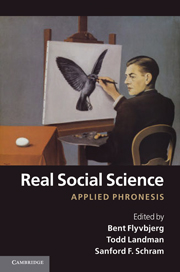Book contents
- Frontmatter
- Contents
- Figures
- Tables
- Contributors
- Acknowledgements
- 1 Introduction: new directions in social science
- Part I Theory and method
- 2 Phronetic social science: an idea whose time has come
- 3 Phronesis and narrative analysis
- 4 The feel for power games: everyday phronesis and social theory
- 5 Phronesis, projects and power research
- Part II Applied phronesis
- 6 Why mass media matter and how to work with them: phronesis and megaprojects
- 7 Power and conflict in collaborative research
- 8 Unsettling a settler society: film, phronesis and collaborative planning in small-town Canada
- 9 Phronesis and critical policy analysis: Heathrow's ‘third runway’ and the politics of sustainable aviation in the United Kingdom
- 10 Amnesty in the age of accountability: Brazil in comparative context
- 11 Feminist phronesis and technologies of citizenship
- 12 Making the teaching of social justice matter
- 13 Spatial phronesis: a case study in geosurveillance
- 14 Important next steps in phronetic social science
- Index
- References
6 - Why mass media matter and how to work with them: phronesis and megaprojects
Published online by Cambridge University Press: 05 June 2012
- Frontmatter
- Contents
- Figures
- Tables
- Contributors
- Acknowledgements
- 1 Introduction: new directions in social science
- Part I Theory and method
- 2 Phronetic social science: an idea whose time has come
- 3 Phronesis and narrative analysis
- 4 The feel for power games: everyday phronesis and social theory
- 5 Phronesis, projects and power research
- Part II Applied phronesis
- 6 Why mass media matter and how to work with them: phronesis and megaprojects
- 7 Power and conflict in collaborative research
- 8 Unsettling a settler society: film, phronesis and collaborative planning in small-town Canada
- 9 Phronesis and critical policy analysis: Heathrow's ‘third runway’ and the politics of sustainable aviation in the United Kingdom
- 10 Amnesty in the age of accountability: Brazil in comparative context
- 11 Feminist phronesis and technologies of citizenship
- 12 Making the teaching of social justice matter
- 13 Spatial phronesis: a case study in geosurveillance
- 14 Important next steps in phronetic social science
- Index
- References
Summary
The purpose of the present chapter is to demonstrate how social scientists may engage with mass media to have their research impact public deliberation, policy and practice. Communicating research to practice is part and parcel of applied phronesis and not something external to it. Even in Aristotle's original definition of phronesis, laid down more than two millennia ago, the knowledge–action relationship is clear. A defining characteristic of phronesis is, in Aristotle's words, that it is ‘reason capable of action’ (The Nicomachean Ethics, 1976: Bk VI, 1140a24–1140b12). Phronetic research results (‘reason’) are therefore results only to the extent they have an impact on practice (‘action’). In public affairs, reason is made capable of action by effectively having reason enter the public sphere and public deliberation. It is reason times exposure in the public sphere that matters, not reason alone. Today, mass media dominate the public sphere in liberal democracies. The relationship of research with media therefore needs to be reflected. However, to my knowledge no study exists that describes in detail this aspect of phronetic research. Even in social science as a whole, studies of how scholars work with mass media to secure public impact of their research seem rare (Bagdikian 2004; McCombs 2004; Bryant and Oliver 2009). This, then, is the purpose of the present chapter: to begin to close this gap in our knowledge of social science and phronesis. Because the field is underexplored, it was found to be prudent to start with a phenomenological case study. The study shows how a group of phronetic social scientists, including the author, engaged with media, including world-leading titles such as The New York Times, in order to place their research results on the public agenda and initiate change in their chosen field of interest: megaproject policy and management.
- Type
- Chapter
- Information
- Real Social ScienceApplied Phronesis, pp. 95 - 121Publisher: Cambridge University PressPrint publication year: 2012
References
- 20
- Cited by



